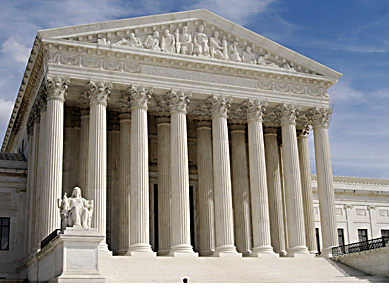Share it
 The US Supreme Court last week handed down a decision in Holder v Humanitarian Law Project which has caused very considerable controversy as it would seem very significantly to restrict the right under the US Constitution to freedom of expression.
The US Supreme Court last week handed down a decision in Holder v Humanitarian Law Project which has caused very considerable controversy as it would seem very significantly to restrict the right under the US Constitution to freedom of expression.
The Antiterrorism and Effective Death Penalty Act of 1996 prohibited the provision of “material support or resources” to certain proscribed terrorist organisations. These included the Kurdistan Workers (the “PKK”) and the Liberation Tigers of Tamil Eelam (the “LTTE”). Under the Act, “material support or resources” was defined broadly to include:
“currency or monetary instruments or financial securities, financial services, lodging, training, expert advice or assistance, safehouses, false documentation or identification, communications equipment, facilities,weapons, lethal substances, explosives, personnel … and transportation, except medicine or religious materials”
The plaintiffs in this case were two individuals and six organisations. They wanted to provide the following services to the PKK and/or the LTTE:
1. training in the use humanitarian and international law to peacefully resolve disputes;
2. teaching how to petition various representativebodies such as the United Nations for relief;
3. training to present claims for tsunami-related aid to mediators and international bodies;
4. offering legal expertise in negotiating peace agreements; and
5. engaging in political advocacy for the groups.
The concern on the part of the plaintiffs was that in providing these services, they would be in breach of the the Act. Accordingly, they sought a declation from the Court that the provision of these services would be permitted arguing, among other things, that any restriction on the provision of these services would be inconsistent with their First Amendment right to free speech.
After a twelve year history, where the lower courts had partially upheld the plaintiffs’ argument and Congress had slightly amended the Act, the case went to the Supreme Court. One six-three majority, the Court dismissed the case.
Justice Roberts, giving the majority judgment, held that giving support of any kind to a terrorist group “frees up other resources … which may be put to violent ends” and “helps lend legitimacy”. It is particularly striking how Justice Roberts questioned the harmlessness of the services proposed saying that in terms of
- training in the use humanitarian and international law to peacefully resolve disputes – it “is wholly foreseeable that the PKK could use as part of a broader strategy to promote terrorism”;
- teaching how to petition for relief – relief could include money which “is fungible … and Congress logically concluded that money a terrorist group such as the PKK obtains using the techniques plaintiffs propose to teach could be redirected to funding the group’s violent activities”; and
- engaging in political advocacy – in this regard “the plaintiffs proposals were phrased at such a high level of generality that they cannot prevail in this preenforcement challenge”.
In his dissenting judgment, Justice Breyer accepted that the Government did “identify a compelling countervailing interest, namely, the interest in protecting the securityof the United States and its nationals from the threats that foreign terrorist organizations pose by denying those organizations financial and other fungible resources”. However, he asked how the “application of the statute to the protected activities before us help achieve that important security-related end” and noted that the “Government has provided us with no empirical information that might convincingly support [the] claim” that the services proposed may assist the groups in their terrorist ends.
The judgment has given rise to significant criticism and comment. scotusbog’s take on it us here. A trenchant comment from one of the lawyers for the plaintiffs is here noting in particular that the Supreme Court takes a generous view of the First Amendment when applying it to corporations and campaign finance but not to human rights groups.
Over here, the ukhumanrightsblog notes that similar provisions to those in question in Holder in in force under section 12 of the Terrorism Act 2000 although whether this extends to the services in question in Holder is unclear.
At Strasbourg, the ECrtHR has historically upheld reporting restrictions on terrorist organisations. In Purcell v Ireland, the Commission (in an admissibility decision) upheld a reporting ban on Sinn Fein stating
“The restrictions are designed to deny representatives of known terrorist organisations and their political supporters the possibility of using the broadcast media as a platform for advocating their cause, encouraging support for their organisations and conveying the impression of their legitimacy.”
At Strasbourg, the Cout has historically upheld reporting restrictions on terrorist organisations. In Purcell v Ireland, the Commission (in an admissibility decision) upheld a reporting ban on Sinn Fein accepting – as with the majority in Holder – apparently somewhat speculative justifications for the ban. In particular, the Commission stated:
“The restrictions are designed to deny representatives of known terrorist organisations and their political supporters the possibility of using the broadcast media as a platform for advocating their cause, encouraging support for their organisations and conveying the impression of their legitimacy.”
However, more recently, in Cetin and Others v Turkey, the Court held that restrictions on a newspaper ostensibly to assist in the fight against terrorism was a breach of Article 10. Similarly, in Ustun v Turkey, the Court rejected somewhat speculative justifications for the banning of a book on Kurdish nationalism stating “although the passages highlighted by the prosecution do give the narrative a hostile tone, they do not encourage violence, armed resistance or insurrection, and do not constitute hate speech” which the Court considered to be “an essential consideration”.
On this basis, there are some grounds for thinking that the ECrtHR might take the view of the minority in Holder and require tangible and evidence based justifications for restrictions of speech of this kind.


1 comment